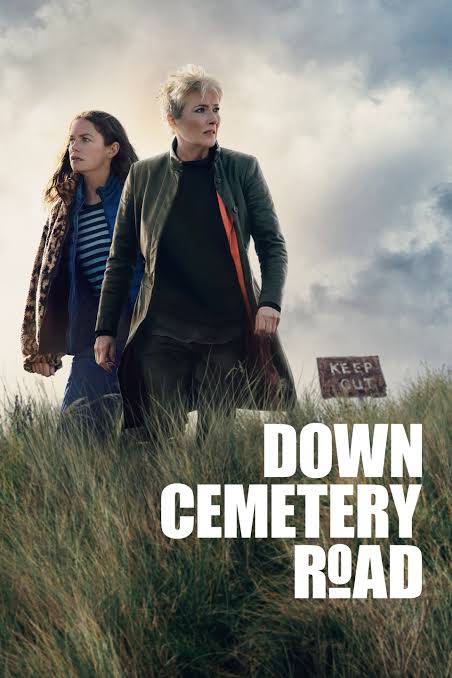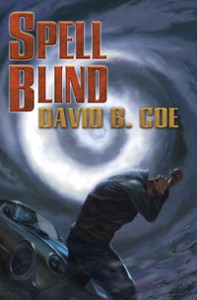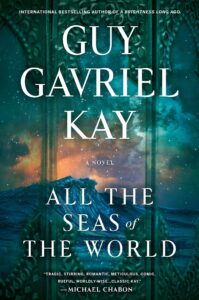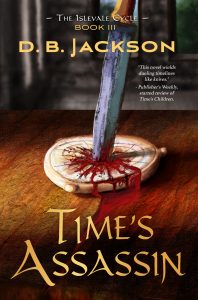Nancy and I have been doing a good deal of streaming in our new(-ish) home. We did in the old house, too, once we got serviceable internet (it only took 29 years), but our last year in Tennessee was filled with travel, packing, cleaning, more packing, looking at houses, etc. This year has been far more relaxed.
And though no one has asked, I thought I would offer my thoughts on some of the shows we have been watching recently. As Eeyore famously said, “I’m not asking anyone; I’m just telling everyone.” My opinions, of course, are my own and offered merely in the interest of starting a conversation. So, without further ado….
The Witcher, Netflix (Season 4) — Let me say up front that I came to the series first. I never played the game and I have not yet read the books. Same with Nancy. We loved the first three seasons, and were disappointed when Henry Cavill left the show. By the same token, we were willing to give Liam Hemsworth a chance to fit into the role. Now that we have watched Season 4 . . . well, let’s start with the not-God-awful. Hemsworth was not terrible. He wasn’t good, either. He was adequate. Cavill made the part his own. Hemsworth tried to be Cavill, and he just isn’t. In another role, maybe that’s fine, or even better than fine. But Geralt is Cavill, and Cavill is Geralt, and Hemsworth didn’t work in the role. Other performances were okay, but the scripts. My God, the scripts. They were DREADFUL. Bad dialogue, questionable plot choices, and an utter lack of progress on the main storylines. The season went absolutely nowhere, and I am left wondering why I would waste eight more hours on the show. Lots of pointless, graphic violence. 1 star out of 5.
The Diplomat, Netflix (Season 3) — Seasons 1 and 2 were amazing, and Season 3 more than matched them. Adding Allison Janney and Bradley Whitford to an outstanding cast that already featured Keri Russell, Rufus Sewell, David Gyasi, Ali Ahn, and Ato Essandoh, elevated the show. The writing continues to be crisp, intelligent, and thoughtful, reminding me of the best seasons of Aaron Sorkin’s The West Wing. The show is compelling, beautifully filmed, and just immensely fun. 4.5 stars out of 5.
 Down Cemetery Road, Apple (Season 1) — A taut, twisty, dark thriller starring Ruth Wilson, Emma Thompson, Fehinti Balogun, and Nathan Stewart-Jarrett, this is our new favorite show. Thompson and Balogun really stand out, but all the performances are terrific. Again, wonderful writing makes the show. There is humor and also some very graphic violence. The story, which involves intrigue deep in the British security state, has kept us utterly rapt. The last episode of Season 1 drops on Wednesday, and we will be holding our breath until then. Sooooo good. 4.5 stars out of 5.
Down Cemetery Road, Apple (Season 1) — A taut, twisty, dark thriller starring Ruth Wilson, Emma Thompson, Fehinti Balogun, and Nathan Stewart-Jarrett, this is our new favorite show. Thompson and Balogun really stand out, but all the performances are terrific. Again, wonderful writing makes the show. There is humor and also some very graphic violence. The story, which involves intrigue deep in the British security state, has kept us utterly rapt. The last episode of Season 1 drops on Wednesday, and we will be holding our breath until then. Sooooo good. 4.5 stars out of 5.
Nobody Wants This, Netflix (Season 2) — A romcom about a rabbi who falls in love with a podcaster who is not Jewish. After a promising first season, which offered plenty of laughs and some warm moments, the second season has disappointed. The cast (Adam Brody, Kristen Bell, Justine Lupe, Timothy Simons, Jackie Tohn) is good, but the storyline has stalled, falling into predictable, repetitious patterns. I wanted to love it, but I don’t. 2.5 stars out of 5.
Shrinking, Apple (Season 2) — This quirky comedy stars Jason Segel as a psychiatrist who has lost his wife and is learning to cope with his grief. Sounds less than hilarious, I know, but it works. The ensemble, including Harrison Ford, Jessica Williams, Lukita Maxwell, Crista Miller, and Luke Tennie, is terrific, as is the chemistry among the various characters. Some of the predicaments are predictable, and a few of the jokes don’t land, but overall, it’s a fun show that is oh-so-easy to binge. 4 stars out of 5.
High Potential, ABC (Season 2) — Yes, an actual traditional-network offering. Kaitlin Olson plays an “ordinary mom” who is anything but. She is actually a genius, with a knack for knowing and seeing things no one else does, which makes her a perfect consultant for the LA police department. Yeah, the set-up is somewhat far-fetched, as are the case solutions, which almost always come in the nick of time. But the show is fun if you don’t think about it too hard. The cast includes Daniel Sunjata, Judy Reyes, Amirah J, Deniz Akdeniz, and Javicia Leslie. 3 stars out of 5.
Slow Horses, Apple (5 Seasons) — We’re playing catch-up with this one and are currently finished with Season 3. So far, it’s fantastic. Every episode is gripping and effective. Gary Oldman, who plays the unkempt, slightly boorish, flatulent, but brilliant head of a misfit team of MI5 spies, gives an Emmy-worthy performance, making his obnoxious character somehow likable and formidable. Kirsten Scott Thomas and Jack Lowden are also stellar in supporting roles, as are Saskia Reeves, Rosalind Eleazar, and Christopher Chung. Warning: some graphic violence. 4.5 stars out of 5.
And that’s it for now! Feel free to share your thoughts on whichever social media platform brought you to my blog!
Have a great week.









 Very early in my career, when my first book, Children of Amarid, was the only one I had out, I responded publicly to a online review from a less-than-delighted reader. Amazon was still a novelty (no pun intended) as was the notion of online reader reviews. (Hard to imagine, right? That the idea of readers offering reviews of the books they’d read should have been new and different and even a bit odd?) I don’t remember what the reader in question objected to about the book, nor do I remember what I said in my public response. The original book is out of print now — only the 2016 reissues are available on the site, so our exchange is lost to the ages. All I know is that someone criticized the book, I didn’t take the criticism well, and I took it upon myself to write a reply and post it to the Children of Amarid Amazon page.
Very early in my career, when my first book, Children of Amarid, was the only one I had out, I responded publicly to a online review from a less-than-delighted reader. Amazon was still a novelty (no pun intended) as was the notion of online reader reviews. (Hard to imagine, right? That the idea of readers offering reviews of the books they’d read should have been new and different and even a bit odd?) I don’t remember what the reader in question objected to about the book, nor do I remember what I said in my public response. The original book is out of print now — only the 2016 reissues are available on the site, so our exchange is lost to the ages. All I know is that someone criticized the book, I didn’t take the criticism well, and I took it upon myself to write a reply and post it to the Children of Amarid Amazon page. Some years later, soon after the release of Spell Blind, the first book in The Case Files of Justis Fearsson, another Amazon reviewer panned the book because my book was “a blatant rip-off” of Jim Butcher’s Harry Dresden books, “a ludicrous case of copycatting.” For the record, I didn’t copy Dresden at all. I had only read the first two books of the series, and the “copycatting” the reviewer claimed I’d done amounted to using tropes of the genre, not elements of Butcher’s work. And so I responded to the review, wanting to set the record straight.
Some years later, soon after the release of Spell Blind, the first book in The Case Files of Justis Fearsson, another Amazon reviewer panned the book because my book was “a blatant rip-off” of Jim Butcher’s Harry Dresden books, “a ludicrous case of copycatting.” For the record, I didn’t copy Dresden at all. I had only read the first two books of the series, and the “copycatting” the reviewer claimed I’d done amounted to using tropes of the genre, not elements of Butcher’s work. And so I responded to the review, wanting to set the record straight. After publishing
After publishing  As you know at this point, we are in the midst of release week for
As you know at this point, we are in the midst of release week for  The truth is, I have felt that way about all three volumes of this trilogy. The Islevale books were incredibly difficult to write. I knew going in that writing time travel would be really hard — as one friend told me, “It’ll make your brain explode.” So much can go wrong. We have to examine every plot point from every possible angle to make certain it holds up to logic, and to the simple reality that time travel gives us endless opportunities for do-overs. Put another way, every event in a time travel story is negotiable. Each one can be altered or reversed by the very plot devices on which our stories depend.
The truth is, I have felt that way about all three volumes of this trilogy. The Islevale books were incredibly difficult to write. I knew going in that writing time travel would be really hard — as one friend told me, “It’ll make your brain explode.” So much can go wrong. We have to examine every plot point from every possible angle to make certain it holds up to logic, and to the simple reality that time travel gives us endless opportunities for do-overs. Put another way, every event in a time travel story is negotiable. Each one can be altered or reversed by the very plot devices on which our stories depend. I hoped that
I hoped that  I frequently tell beginning writers that they need to self-define success, something which is really hard to do in this business. All too often we writers are forced by the nature of publishing to seek exterior affirmation for our work — reviews, sales, awards if we’re fortunate enough to win them. These are the things the industry values and so, naturally, they are the things we care about as well. The problem with this is, the industry is cruel and capricious. We all know of good, even great, books that go unnoticed and unacknowledged. We all have seen mediocrity rewarded with terrific sales and undeserved attention. And we know that this is true in the world beyond publishing as well. Life is not always fair.
I frequently tell beginning writers that they need to self-define success, something which is really hard to do in this business. All too often we writers are forced by the nature of publishing to seek exterior affirmation for our work — reviews, sales, awards if we’re fortunate enough to win them. These are the things the industry values and so, naturally, they are the things we care about as well. The problem with this is, the industry is cruel and capricious. We all know of good, even great, books that go unnoticed and unacknowledged. We all have seen mediocrity rewarded with terrific sales and undeserved attention. And we know that this is true in the world beyond publishing as well. Life is not always fair.